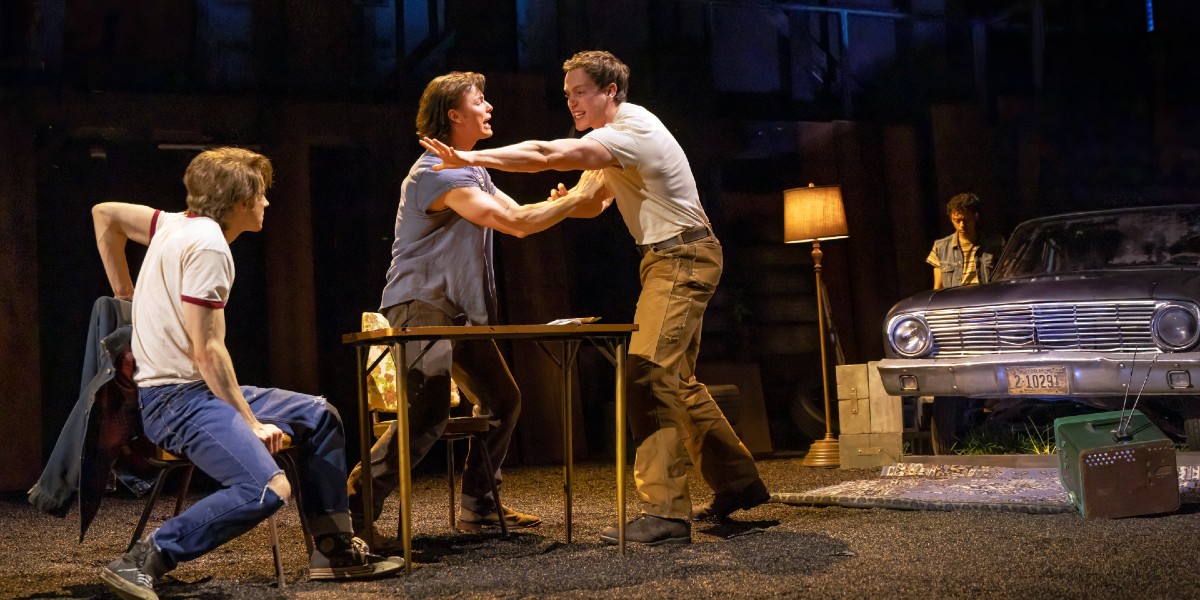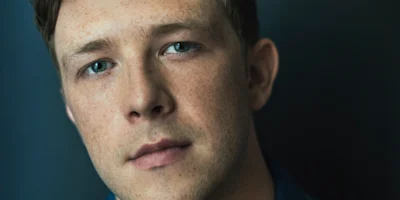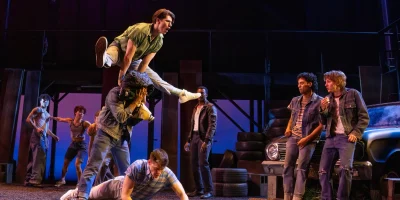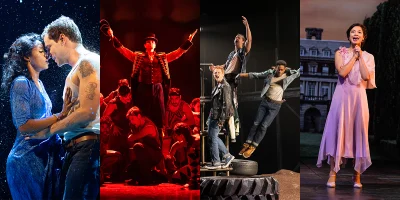
What makes 'The Outsiders' sing on Broadway
The new stage adaptation of S. E. Hinton's 1967 novel is nominated for 12 Tony Awards, including Best Musical, Best Original Score, and Best Book of a Musical.
In 1957, creators Jerome Robbins, Leonard Bernstein, Stephen Sondheim, and Arthur Laurents would make a smash success out of a peculiar idea: a musical about violent street gangs. West Side Story would go on to become a theatrical landmark, stacked with both Broadway and film awards by the time S. E. Hinton, a thousand miles away in Tulsa, Oklahoma, wrote her own landmark novel The Outsiders in 1967.
Hinton's book, too, is about teenage gangs, loosely based on the then-15-year-old author's peers. But that story didn't get the musical treatment until 2022, when The Outsiders premiered in La Jolla, California, and then on Broadway in 2024, earning 12 Tony Award nominations including Best Musical.
If not for West Side Story, one might find it hard to imagine The Outsiders as a musical. Perhaps you still do. You'd be forgiven — some of the show's own cast members once did, too.
"It was meant to be a musical, and I wouldn't have thought that before I read the script and heard the music," said cast member Jason Schmidt, who plays Sodapop. "The way the music is done is so honest to the characters: it's an indie folk, Americana-type style, and the heartfelt nature of the music adds something to the story."
Set in 1967 Tulsa, The Outsiders centers on Ponyboy (2024 Tony nominee Brody Grant), a sensitive, bookish 14-year-old being raised by his older brothers, Darrel and Sodapop. They, along with friends Johnny (nominee Sky-Lakota Lynch) and Dallas (nominee Joshua Boone), make up an underprivileged gang dubbed the Greasers, who are in an ongoing turf war with the well-off Socs.
Music allows each boy to stand out among the ensemble, said Jonathan Clay, who wrote the Tony-nominated score with Zach Chance (his bandmate in the folk duo Jamestown Revival) and Justin Levine.
"Darrel has a lot of angst in his music, and he has a lot of tension, he has a lot of weight on his shoulders," he said. "Ponyboy is a little more lofty, a little more freeform, and he's more idealistic. Johnny is a little more timid and scared. Dally is more bold and big."

The songwriters may have created each character's sound, but they naturally credited Hinton's novel as an invaluable resource. They pulled exact lines as lyrics and song titles, like Johnny's "Stay gold, Ponyboy," which expanded into a full song. Plus, the mood of any given scene as Hinton wrote it informed the tone of the song that would go there.
"[Hinton] exposes these boys in all their everything: their rage, their anger, their tenderness, their hope, their softness," said Tony-nominated director Danya Taymor. "Something so emotionally rich really lends itself to music, which is the most universal art form. It's the easiest to connect to."
And connection is key in The Outsiders. Perhaps the most important function of songs in the musical, the cast and creatives repeatedly said, is to fill in where speech fails. Realistically, the Greasers wouldn't monologue when overwhelmed with emotion — they're conditioned to fight or scream or clam up. Music allows the audience to understand their inner lives, which they can't eloquently express otherwise.
"These boys don't have the vocabulary to say the words that the music lends itself to," said Lakota-Lynch. "A lot of times in musicals, there's a song just to be a song, but in our musical, there's a song when the characters can no longer explain their emotions."
"I think of music in a musical as a metaphor," Levine said. "It's just a musical representation of what would otherwise be spoken, thought, felt, dreamed, etc. In this particular case, this music is a superpower for these kids."
Get The Outsiders tickets now.
Photo credit: The Outsiders on Broadway. (Photos by Matthew Murphy)
Frequently asked questions
What is The Outsiders about?
Experience a classic story of brotherhood and coming of age as a heartfelt folk musical. Inspired by S. E. Hinton's novel and Francis Ford Coppola's film, this show follows the lives of teenage have-nots whose best hope for survival and acceptance is in their brotherhood.
Where is The Outsiders playing?
The Outsiders is playing at Bernard B. Jacobs Theatre. The theatre is located at 242 West 45th Street, New York, 10036.
How long is The Outsiders?
The running time of The Outsiders is 2hr 25min. Incl. 15min intermission.
What's the age requirement for The Outsiders?
The recommended age for The Outsiders is Ages 10+. Children under 4 years old will not be admitted..
How do you book tickets for The Outsiders?
Book tickets for The Outsiders on New York Theatre Guide.
Who wrote The Outsiders musical?
Adam Rapp (book), Jamestown Revival (music and lyrics, composed of Jonathan Clay and Zach Chance), and Justin Levine (book, music, lyrics) wrote The Outsiders. The Broadway musical is based on the 1967 novel by S. E. Hinton.
Who directed The Outsiders?
Danya Taymor directs The Outsiders musical. The niece of Tony-winning director Julie Taymor, she's known for staging Pass Over on Broadway in 2021.
What are the songs in The Outsiders?
The songs in The Outsiders musical are by Jonathan Clay and Zach Chance of Jamestown Revival, along with Justin Levine. The tracks include "Stay Gold," "Tulsa '67," “Grease Got a Hold on You,” and "Great Expectations."
Is The Outsiders musical the same as the book?
The Outsiders musical is similar to the novel and film adaptation, keeping the same characters, plot, and setting. The musical stands apart, however, due to its original score of songs by Jamestown Revival.
Is The Outsiders appropriate for kids?
The Outsiders on Broadway is recommended for kids 11 and older due to depictions of gang violence and themes including death and neglect. Please note that children 4 and younger are not permitted in Broadway theatres.
Is The Outsiders good?
Yes — The Outsiders endures as an American classic, and the musical honors that. Broadway audiences get to experience this story of brotherhood, survival, and hope in a whole new way and with moving folk music.
Originally published on





